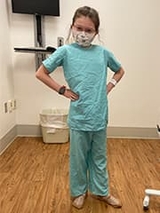VACTERL Association: Olivia’s Story
VACTERL Association: Olivia’s Story
Today, Olivia is an artsy, fun-loving 10-year-old who loves to dance. But within a few hours of her birth, it was clear something wasn’t right. The baby was slightly preterm and a little underweight. In the NICU, she was having trouble maintaining her oxygen saturation levels and was a little “frothy” at the mouth.

Imaging quickly discovered part of the problem: Her esophagus wasn’t attached to her stomach. Instead, it ended in a pouch and was adhered to her trachea — a form of esophageal atresia. Within 18 hours of being born, Olivia underwent her first surgery to correct it so she could eat and properly digest her food.
Over the next few weeks, Olivia had genetic testing done and further evaluation discovered she had other health issues including vertebral anomalies and a missing kidney.
In time, doctors confirmed she had VACTERL association, sometimes called VATER syndrome, a rare cluster of birth defects that affects multiple body systems and organs. VACTERL is an acronym for the body parts commonly affected: Vertebrae, Anus, Cardiac (heart), Trachea, Esophagus, Renal (kidneys) and Limb differences. The condition can present differently in each patient, but to be diagnosed with VACTERL association, at least three of these specific systems/organs must be affected.
Special patients need specialized care

The good news: Most of the symptoms of VACTERL can be treated or at least managed through surgery and other interventions. But because VACTERL association presents differently – and affects different organs within each patient – there is no one-size-fits-all treatment plan.
In Olivia’s case, early treatment included:
- a series of operations to ensure her esophagus remained open and not blocked,
- a gastrostomy tube (G-tube) to help keep her hydrated,
- surgery to address reflux that was affecting her breathing, and
- operations to fix a tethered spinal cord.
While Olivia made tremendous strides with doctors near her home in Seattle, WA, her condition continued to impact her day-to-day quality of life. Her bowel and bladder function were compromised, and her repaired esophagus had no motility – meaning food didn’t travel though her gastrointestinal (GI) system as it should. These issues meant Olivia had to spend hours each day on personal care, making it challenging to attend after-school activities and social events she wanted to participate in.
To improve her daughter’s quality of life, Olivia’s mom Fallon, sought a specialist who could provide more advanced treatment options for Olivia. After some research, she found Hayat Mousa, MD, then Director of the Neurogastroenterology and Motility Center at Rady Children’s Hospital-San Diego. The trio hit it off and early interventions in California began to have a positive impact on Olivia.
Following a motility expert across the country

When Dr. Mousa was hired to lead the Suzi and Scott Lustgarten Center for GI Motility at Children’s Hospital of Philadelphia (CHOP) in September 2020, Fallon and Olivia decided to follow her for care. They began traveling to the East Coast for appointments with the world-renowned expert in pediatric gastrointestinal motility disorders.
The Lustgarten Center for GI Motility is part of CHOP’s Division of Gastroenterology, Hepatology and Nutrition, and its team regularly partners with other CHOP programs and specialties as needed for patients with complex multi-organ conditions like VACTERL association. In Olivia’s case, Dr. Mousa consulted with the Center for Pediatric Airway Disorders for support with her complex airway and swallowing issues.
Dr. Mousa’s treatment for Olivia has included working to optimize the functionality of a cecostomy tube which was placed in Seattle, but was not improving her bowel function until she came to CHOP. The preteen is being evaluated to determine if a sacral nerve stimulator – which Dr. Mousa has used successfully to treat other patients with significant motility disorders – could help Olivia achieve greater bowel and bladder control. The goal of treatment now is to improve Olivia’s bowel and bladder symptoms, boost her esophageal function and enhance her overall quality of life.
The family travels to Philadelphia three to five times a year for appointments, testing and surgery. It’s not easy for the family — besides the financial expense of cross-country travel, mother and daughter must plan around work and school. Despite the challenges, Fallon says she believes seeing Dr. Mousa at CHOP is well worth the effort.
“Since we’ve started seeing Dr. Mousa, Olivia has made tremendous progress in managing her bowels,” says Fallon. “It’s not optimal yet, but we’ve made strides and Dr. Mousa is always willing to try more options.
“We’ve learned more about how Olivia’s GI functions in the past two years than we have in the prior eight years [with other providers],” Fallon says ”
Alice Huang, MD, a motility fellow with CHOP’s Motility Center who works with Dr. Mousa says Olivia’s family and their “immense, ongoing commitment to travel across the country to ensure their daughter receives the best care possible is an exceptional display of parental unconditional love and strength.
“They not only go the extra mile; they’re going the extra thousands of miles!”
As symptoms improve, more time for fun

Fallon and Olivia have been so impressed with the care at CHOP that they’ve begun seeing urology specialists, in addition to GI and general surgery. They are even considering relocating to the Philadelphia area to be closer to Dr. Mousa and the vast pediatric health resources available at CHOP.
“CHOP has been a really good move for us. You need a team that’s a little more specialized and innovative when you have a complex condition,” says Fallon. “We’ve gotten fantastic care. Just having someone who is humble enough to say, ‘I don’t know,’ or ‘Let’s look,’ is huge.”
More importantly, Fallon noted that as Olivia’s condition continues to improve, she’s able to spend less time on her health issues and more time just being a regular kid – going to school, dancing, learning to rollerblade and living life on her terms.